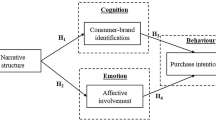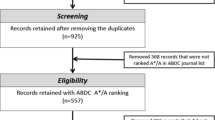Abstract
Research on employees’ purchase of their employer’s product is scarce. In this paper, we investigate how psychological contracts will impact employees’ purchase motivations of their employer brand. Two studies examining real and imagined purchase behaviors show that employees with relational type of psychological contracts are more likely to purchase their employer brand than are employees with transactional type of psychological contracts. This is because the former type of psychological contracts will encourage both intrinsic and extrinsic motives to support the employer brand.

Similar content being viewed by others
References
Argo, J. J., Dahl, D. W., & Manchanda, R. V. (2005). The influence of a mere social presence in a retail context. Journal of Consumer Research, 32(2), 207–212.
Bearden, W. O., & Etzel, M. J. (1982). Reference group influence on product and brand purchase decisions. Journal of Consumer Research, 9, 183–194.
Bhattacharya, C. B., & Sen, S. (2003). Consumer-company identification: a framework for understanding consumers’ relationships with companies. Journal of Marketing, 67(2), 76–88.
Bommer, W. H., Miles, E. W., & Grover, S. L. (2003). Does one good turn deserve another? Coworker influences on employee citizenship. Journal of Organizational Behavior, 24, 181–196.
Bowerman, B. L., & O’Connell, R. T. (1990). Linear statistical models: an applied approach. Belmont: Duxbury.
Burnkrant, R. E., & Cousineau, A. (1975). Informational and normative social influence in buyer behavior. Journal of Consumer Research, 2(3), 206–215.
Cialdini, R. B., & Goldstein, N. J. (2004). Social influence: compliance and conformity. Annual Review of Psychology, 55, 591–621.
Conway, N., & Briner, R. B. (2005). Understanding psychological contracts at work: a critical evaluation of theory and research. New York: Oxford University Press.
Coyle-Shapiro, J., & Kessler, I. (2000). Consequences of the psychological contract for the employment relationship: a large scale survey. Journal of Management Studies, 37(7), 903–930.
Csikszentmihalyi, M. (2003). Good business: leadership, flow and the making of meaning. New York: Viking.
Cullen, T. (2005). Deep discounts, freebies keep these workers happy. The Wall Street Journal.
Deci, E. L., & Ryan, R. M. (1985). Intrinsic motivation and self-determination in human behavior. New York: Plenum Press.
Fradin, R. (2013). Your employees and word-of-mouth marketing. The Wall Street Journal.
Fram, EH, & McCarthy, MS (2003). From employee to brand champion. Marketing Management, 24–29.
Fram, EH, & McCarthy, MS (2004). What’s not to like? Marketing Management, 36–40.
Gillet, N., Vallerand, R. J., & Rosnet, E. (2009). Motivational clusters and performance in a real-life setting. Motivation and Emotion, 33, 49–62.
Glomb, T. M., & Liao, H. (2003). Interpersonal aggression in work groups: social influence, reciprocal, and individual effects. Academy of Management Journal, 46, 486–496.
Hall, D. T., & Moss, J. E. (1998). The new protean career contract: helping organizations and employees adapt. Organizational Dynamics, 26, 22–37.
Hayenga, A. O., & Corpus, J. H. (2010). Profiles of intrinsic and extrinsic motivations: a person-centered approach to motivation and achievement in middle school. Motivation and Emotion, 34(4), 371–383.
Hind, P., Frost, M., & Rowley, S. (1996). The resilience audit and the psychological contract. Journal of Managerial Psychology, 11(7), 18–29.
Ho, V. T. (2005). Social influence on evaluations of psychological contract fulfillment. Academy of Management Review, 30(1), 113–128.
Ho, V. T., & Levesque, L. L. (2005). With a little help from my friends (and substitutes): social referents and influence in psychological contract fulfillment. Organization Science, 16, 275–289.
Lambert, L. S., Edwards, J. R., & Cable, D. M. (2003). Breach and fulfillment of the psychological contract: a comparison of traditional and expanded views. Personnel Psychology, 56, 895–934.
Latané, B. (1981). The psychology of social impact. American Psychologist, 36(4), 343–356.
Luo, X. (2005). How does shopping with others influence impulsive purchasing? Journal of Consumer Psychology, 15(4), 288–294.
Lusch, R., Boyt, T., & Schuler, D. (1996). Employees as customers: the role of social control and employees socialization in developing patronage. Journal of Business Research, 35, 179–187.
Millward, L. J., & Hopkins, L. J. (1998). Psychological contracts, organizational and job commitment. Journal of Applied Social Psychology, 28, 1530–1556.
Mitchell, C. (2002). Selling the brand inside. Harvard Business Review, 80(1), 99–105.
Montes, S. D., & Irving, P. G. (2008). Disentangling the effects of promised and delivered inducements: Relational and transactional contract elements and the mediating role of trust. Journal of Applied Psychology, 93(6), 1367–1381.
Moody, R. C., & Pesut, D. J. (2006). The motivation to care: application and extension of motivation theory to professional nursing work. Journal of Health Organization and Management, 20(1), 15–48.
Morrison, E. W. (1993). Newcomer information seeking: exploring types, modes, sources, and outcomes. Academy of Management Journal, 36(3), 557–589.
Morrison, E. W., & Robinson, S. L. (1997). When employees feel betrayed: a model of how psychological contract violation develops. Academy of Management Review, 22, 226–256.
O'Neill, B. S., & Adya, M. (2007). Knowledge sharing and the psychological contract: managing knowledge workers across different stages of employment. Journal of Managerial Psychology, 22(4), 411–436.
Ouchi, W (1981). Theory Z: how American business can meet the Japanese challenge. Addison-Wesley.
Pech, R. (2001). Reflections: termites, group behaviour, and the loss of innovation: Conformity rules! Journal of Managerial Psychology, 16(7/8), 559–574.
Philipp, B. L. U., & Lopez, P. D. J. (2013). The moderating role of ethical leadership: investigating relationships among employee psychological contracts, commitment and citizenship behavior. Journal of Leadership & Organizational Studies, 20(3), 304–315.
Raja, U., Johns, G., & Ntalianis, F. (2004). The impact of personality on psychological contracts. Academy of Management Journal, 47, 350–367.
Robinson, S. L. (1998). Monkey see, monkey do: the influence of work groups on the antisocial behavior of employees. Academy of Management Journal, 41, 658–672.
Robinson, S. L., Kraatz, M. S., & Rousseau, D. M. (1994). Changing obligations and the psychological contract: a longitudinal study. Academy of Management Journal, 37, 137–152.
Rousseau, D. M. (1989). Psychological and implied contracts in organizations. Employee Responsibilities and Rights Journal, 2, 121–139.
Rousseau, D. M. (1990). New hire perceptions of their own and their employer's obligations: a study of psychological contracts. Journal of Organizational Behavior, 11, 389–400.
Rousseau, D. M. (1995). Psychological contracts in organizations: understanding written and unwritten agreements. Thousand Oaks: Sage.
Rousseau, D. M. (2004). Psychological contracts in the workplace: understanding the ties that motivate. Academy of Management Executive, 18(1), 120–127.
Rousseau, D. M., & Tijorwala, S. A. (1999). What's a good reason to change? Motivated reasoning and social accounts in promoting organizational change. Journal of Applied Psychology, 84(4), 514–528.
Ryan, R. M., & Deci, E. L. (2000). Self-determination theory and the facilitation of intrinsic motivation, social development, and well-being. American Psychologist, 55(1), 68–78.
Schein, E. H. (1980). Organizational psychology. Englewood Cliffs: Prentice-Hall.
Tavassoli, N. (2008). Branding from the inside out. Business Strategy Review, 19(2), 94–95.
Thomas, H. D. C., Au, K., & Ravlin, E. C. (2003). Cultural variation and the psychological contract. Journal of Organizational Behavior, 24, 451–471.
Tian, K., & Belk, R. W. (2005). Extended self and possessions in the workplace. Journal of Consumer Research, 32(2), 297–310.
Trevino, L. K., & Victor, B. (1992). Peer reporting of unethical behavior: a social context perspective. Academy of Management Journal, 35(1), 38–64.
Author information
Authors and Affiliations
Corresponding author
Rights and permissions
About this article
Cite this article
DeMotta, Y., Sen, S. How psychological contracts motivate employer-brand patronage. Mark Lett 28, 385–395 (2017). https://doi.org/10.1007/s11002-017-9426-5
Published:
Issue Date:
DOI: https://doi.org/10.1007/s11002-017-9426-5




